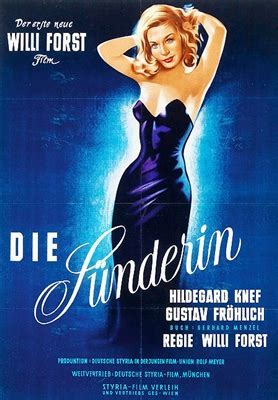A moderate scandal in its day, Willi Forst’s
The Sinner doesn’t leave much of an impact now, although one may enjoy
registering the various points of bygone envelope-pushing: a brief nude scene;
a wild party which manages to convey a passing sense of recklessness despite
everyone having their clothes on; the fairly non-judgmental portrayal of a
woman, Marina (Hildegard Knef), working a world of men for her own financial advantage. Marina’s
life of sinning, which includes sleeping for profit with a besotted stepbrother
whom she hates, and consorting indifferently with Nazi soldiers during the war
and American ones thereafter, comes mostly to an end when she falls in love
with a troubled painter, Alexander (not entirely though – for instance, during
a phase when Alexander’s work isn’t selling, she helps things along by having
sex with an art dealer). Alexander’s profession fuels a few expressionist
highlights, such as the arty juxtapositions of his head against titillating
extracts from his work, but Gustav Frohlich’s dull performance makes the
character’s artistic identity, and the attraction between him and Marina, more mysterious
than seems to be intended; the disappointing ending merely suggests that while
Marina may at one time have been defined by her sinning, she now finds
definition only in Alexander’s eyes and work, to the point of seeing no
worthwhile existence without him. Among other weaknesses, the film has an
overly busy structure, tiresomely navigating between past and present as it
attempts to place Marina’s current actions in context, while its over-reliance
on her voice-over (which accounts for well over half of all words spoken in the
film) imposes a recurring tonal similarity. And while, as noted, the film doesn’t
entirely deny Germany’s then-recent past (it also includes a brief appearance
by some Gestapo agents), the absence of much perspective in this
regard doesn't age too well either.


No comments:
Post a Comment